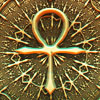Unto Thee
 About forty years ago, a Chinese representative of the ROSICRUCIAN BROTHERHOOD visited the Rosicrucian Fraternity in San Jose, California. He brought with him a manuscript which had been kept in a secret Asian archive for thousands of years. It was said to have been authored by the Egyptian Pharoah Akhnaton, historically the founder of monotheism. The Rosicrucians translated this book and published it under the title Unto Thee I Grant.
About forty years ago, a Chinese representative of the ROSICRUCIAN BROTHERHOOD visited the Rosicrucian Fraternity in San Jose, California. He brought with him a manuscript which had been kept in a secret Asian archive for thousands of years. It was said to have been authored by the Egyptian Pharoah Akhnaton, historically the founder of monotheism. The Rosicrucians translated this book and published it under the title Unto Thee I Grant.
There is every indication throughout the work as it appears in the following that it was written by Amenhotep IV, Pharaoh of Egypt, during the years 1360 to 1350 B.C., or thereafter, or by some one of his successors in the great school of mysticism which he founded in Egypt.
Reference to any encyclopedia will reveal the fact that this Pharaoh upset the priesthood teachings and idol worship of Egypt by the establishment of a monotheistic, mystical religion, and every authority on the history of religions points to him as the first man in the civilized world to proclaim the belief in one God; and he has been rightfully called “the greatest modernist of all times.” He established a cult or Secret Brotherhood based upon this mystical religion in the city which he founded and named Akhetaton.
Recent translations of the writings discovered on the walls and columns in his mystical temple in Egypt show, for instance, that he was the author of those beautiful passages which are incorporated in the Christian Bible as the hundred and fourth Psalm, and many sacred writings of the East have been very definitely traced to his school and Brotherhood.
Copies of the teachings and doctrines used in Egypt at that time undoubtedly reached Jerusalem and other parts of the world through the exodus of the Jews and many proofs have been found to show that the high mystical teachings of this Pharaoh of Egypt and his followers were the foundation of such cults and schools as the Essenes, to which the Master Jesus belonged, and which later evolved into a fraternity known as the “Brethren of the Rose Cross” or the Rosicrucians, referred to by Lord Bulwer-Lytton in his book “Zanoni” and many others who have given time to such research, including Sir Francis Bacon, who at one time was chief executive of the Order of the Rosicrucians throughout continental Europe.
The probability of this authorship of the following doctrines makes this work one of the most important contributions to sacred literature and one of the most interesting publications in the field of mystical teachings that has come to light in the past few centuries. Reproduced herewith, is the official warrant and privilege for the production of this book in modern form by the secret organization, whose chief executive possesses the only copy now known to exist. ~ Sri Ramatherio
UNTO THEE I GRANT
by Akhnaton
Preliminary Instructions
BOW DOWN YOUR heads unto the dust, O ye inhabitants of earth! be silent and receive, with reverence these instructions from on high.
Wheresoever the sun doth shine, wheresoever the wind doth blow, wheresoever there is an ear to hear, and a mind to conceive; there let the precepts of life be made known, let the maxims of truth be honored and obeyed.
All things proceed from God. His power is unbounded. His wisdom is for eternity, and His goodness endureth forever.
He sitteth on His throne in the centre of the universe and the breath of His mouth giveth life to the world.
He toucheth the stars with His fingers, and they run their course rejoicing.
On the wings of the wind He walketh abroad, and performeth His will through all the regions of unlimited space.
Order and grace, and beauty, spring from His hand.
The voice of wisdom speaketh in all His works; but the mortal understanding comprehendeth it not.
The shadows of mortal knowledge passeth over the brain of man as a dream: he seeth as in the dark; he reasoneth, and is deceived.
But the wisdom of God is as the Light of Heaven: it requireth not reason; His mind is the fountain of truth.
Justice and mercy wait before His throne; benevolence and love enlighten His countenance for ever.
Who is like unto God in glory? Who in power shall contend with the Almighty? Hath He any equal in wisdom? Can any in goodness be compared unto Him? There is none other before Him!
He it is, O man, who hath created thee; thy present station on earth was fixed by His laws: the powers of thy mind are the gifts of His goodness, the wonders of thy frame are the work of His hand: thy soul is His soul: thy consciousness His consciousness.
Hear then His voice, for it is gracious; and he that obeyeth shall establish his mind in Peace Profound; and bring everlasting growth to the soul that resideth within his body, state after state, on this earth.
Therefore, with these instructions, Unto thee I grant the economy of life. Thy Master
Book One
THE OBLIGATIONS THAT RELATE TO MAN, CONSIDERED AS AN INDIVIDUAL
CHAPTER I
Consideration
COMMUNE WITH THYSELF, O man! and consider wherefore thou wert made.
Contemplate thy powers, contemplate thy wants and thy connections; so shalt thou discover the duties of life, and be directed in all thy ways.
Proceed not to speak or to act, before thou hast weighed thy words, and examined the tendency of every step thou shalt take; so shall disgrace fly far from thee, and in thy house shall shame be a stranger; repentance shall not visit thee, nor sorrow dwell upon thy cheek in this or many lives to come.
The thoughtless man bridleth not his tongue; he speaketh at random and is entangled in the foolishness of his own words. As one runneth in haste, and leapeth over a fence, may fall into a pit on the other side, which he doth not see; so is the man that plungeth suddenly into any action before he hath considered the consequences thereof, and the compensation which The Law will exact.
Hearken therefore unto the voice of Consideration; her words are the words of wisdom, and her paths shall lead thee to safety and truth.
CHAPTER II
Modesty
Modesty Who art thou, O man! that presumes! on thine own wisdom? or why dost thou vaunt thyself on thine own acquirements?
The first step towards being wise, is to know that thou art born mortally ignorant; and if thou wouldst not be esteemed foolish in the judgment of others, cast off the folly of being wise in thine own mortality.
As a plain garment best adorneth a beautiful woman, so a decent behaviour is the greatest ornament of inner wisdom.
The speech of a modest man giveth lustre to truth, and the diffidence of his words absolveth his error.
He relieth not on his mortal wisdom; he weigheth the counsels of a friend, and receiveth the benefit thereof.
He turneth away his ear from his own praise, and believeth it not; he is the last in discovering his own perfections.
Yet, as a veil addeth to beauty, so are his virtues set off by the shade which his modesty casteth upon them.
But behold the vain man, and observe the arrogant: he clotheth himself in rich attire, he walketh in the public street, he casteth around his eyes, and courteth observation.
He tosseth up his head, and overlooketh the poor; he treateth his inferiors with insolence, his superiors in return look down on his pride and folly with laughter.
He despiseth the judgment of others; he relieth on his own opinion, and is confounded.
He is puffed up with the vanity of his imagination; his delight is to hear, and to speak of himself all the day long.
He swalloweth with greediness his own praise, and the flatterer in return eateth him up.
CHAPTER III
Application
Since the days that are past are gone for ever, and those that are to come may not come to thee in thy present state of being, it behoveth thee, O man! to employ the present state, without regretting the loss of that which is past, or too much depending on that which is to come; for of thy next states thou can’st not know except as thy actions now ordain them.
This instant is thine; the next is in the womb of futurity, and thou knowest not what it may bring forth; maturity of the unborn is in the keeping of the Law. Each future state is that thou has created in the present.
Whatsoever thou resolvest to do, do it quickly. Defer not till the evening what the morning may accomplish.
Idleness is the parent of want and pain; but the labour of goodness bringeth forth pleasure.
The hand of diligence defeateth want; prosperity and success are the industrious man’s attendants.
Who is he that hath acquired wealth, that hath risen to power, that hath clothed himself with honour, that is spoken of in the city with praise and that standeth before the king in his counsel? Even he that hath shut out idleness from his house; and hath said, “Sloth thou art mine enemy.”
He riseth up early, and heth down late; he exerciseth his mind with contemplation, and his body with action, and preserveth the health of both.
The slothful man is a burden to himself, his hours hang heavy on his head; he loitereth about, and knoweth not what he would do.
His days pass away like the shadow of a cloud, and he leaveth behind him no sign for remembrance.
His body is diseased for want of exercise, he wisheth for action, but hath not power to move: his mind is in darkness; his thoughts are confused; he longeth for knowledge, but hath no application.
He would eat of the almond, but hateth the trouble of breaking its shell.
His house is in disorder, his servants are wasteful and riotous, and he runneth on toward ruin; he seeth it with his eyes, he heareth it with his ears, he shaketh his head, and wisheth, but hath no resolution; till ruin cometh upon him like a whirlwind, and shame and repentance descend with him to the grave. Yet shall come a day from the Heavens thy soul returneth and shall gather up the dust and animate it.
CHAPTER IV
Emulation
If thy heart thirsteth for honor, if thy ear hath any pleasure in the voice of praise, raise thy mortal self from the dust whereof thou art made, and exalt thy aim to something that is praiseworthy.
The oak that now spreadeth its branches toward the heavens, was once but an acorn in the bowels of the earth. Endeavor to be first in thy calling, whatever it may be; neither let any one go before thee in well-doing; nevertheless, do not envy the merits of another, but improve thine own talents.
Scorn also to depress thy competitor by any dishonest or unworthy method; strive to raise thyself above him only by excelling him; so shall thy contest for superiority be crowned with honor, if not with success.
By a virtuous emulation the spirit of a man is exhalted within him; he panteth after fame, and rejoiceth as a racer to run his course.
He riseth like the palm-tree in spite of oppression; and, as an eagle in the firmament of heaven, he soareth aloft, and fixeth his eye upon the glories of the sun.
The examples of eminent men are in his vision by night; and his delight is to follow them all the day long.
He formeth great designs, he rejoiceth in the execution thereof, and his name goeth forth to the ends of the world.
But the heart of the envious man is gall and bitterness; his tongue spitteth venom; the success of his neighbour breaketh his rest.
He sitteth in his cell repining; and the good that happeneth to another, is to him an evil.
Hatred and malice feed upon his heart, and there is no rest in him.
He feeleth in his own breast no love of goodness, and therefore believeth his neighbour is like unto himself.
He endeavors to depreciate those that excel him, and putteth an evil interpretation on all their doings.
He lieth on the watch and meditates mischief: but the detestation of man pursueth him, he is crushed as a spider in his own web.
CHAPTER V
Prudence
Hear the words of prudence, give heed unto her counsels, and store them in thine heart: her maxims are universal, and all the virtues lean upon her; she is the guide and the mistress of human life.
Put a bridle on thy tongue; set a guard before thy lips, lest the words of thine own mouth destroy thy peace.
Let him that scoffeth at the lame, take care he halt not himself; whosoever speaketh of another’s failings with pleasure, shall hear of his own with bitterness of heart.
Of much speaking cometh repentance, but in silence is safety.
A talkative man is a nuisance to society, the ear is sick of his babbling, the torrent of his words overwhelmeth conversation.
Boast not of thyself, for it shall bring contempt upon thee; neither deride another, for it is dangerous.
A bitter jest is the poison of friendship; and he that cannot restrain his tongue, shall have trouble.
Furnish thyself with the proper accommodations belonging to thy condition; yet spend not to the utmost of what thou canst afford, that the providence of thy youth, may be a comfort to thy old age.
Let thine own business engage thy attention; leave the care of the state to the governors thereof.
Let not thy recreations be expensive lest the pain of purchasing them exceed the pleasure thou hast in their enjoyment.
Neither let prosperity put out the eyes of circumspection, nor abundance cut off the hands of frugality: he that too much indulgeth in the superfluities of life, shall live to lament the want of its necessaries.
From the experience of others do thou learn wisdom; and from their feelings correct thine own faults.
Trust no man before thou hast tried him; yet mistrust not without reason: it is uncharitable.
But when thou hast proved a man to be honest, lock him up in thine heart as a treasure; regard him as a jewel of inestimable price.
Refuse the favours of a mercenary man: they will be a snare unto thee; thou shalt never be quit of the obligation.
Use not today what tomorrow may want; neither leave that to hazard which foresight may provide for, or care prevent.
Yet expect not even from prudence infallible success: for the man knoweth not what the night may bring forth.
The fool is not always unfortunate, nor the wise man always successful; yet never had a fool a thorough enjoyment; never was a wise man wholly unhappy.
CHAPTER VI
Fortitude
Perils, and misfortunes, and want, and pain, and injury, are more or less the certain lot of every man that cometh into the world.
It behoveth thee therefore, O child of calamity! early to fortify thy mind with courage and patience, that thou mayst support, with a becoming resolution, thy allotted portion of human evil.
As a camel beareth labor, and heat, and hunger, and thirst, through deserts of sand, and fainteth not; so the fortitude of man shall sustain him through all perils.
A noble spirit disdaineth the malice of fortune; his greatness of soul is not to be cast down.
He hath not suffered his happiness to depend on her smiles, and therefore with her frowns he shall not be dismayed.
As a rock on the sea shore he standeth firm, and the dashing of the waves disturbeth him not.
He raiseth his head like a tower on a hill, and the arrows of fortune drop at his feet.
In the instant of danger, the courage of his heart sustaineth him; and the steadiness of his mind beareth him out.
He meeteth the evils of life as a man that goeth forth unto battle and returneth with victory in his hand.
Under the pressure of misfortunes, his calmness alleviates their weight, and his constancy shall surmount them.
But the dastardly spirit of a timorous man betrayeth him to shame.
By shrinking under poverty, he stoopeth down to meanness; and by tamely bearing insults he inviteth insults.
As a reed is shaken with the breath of the air, so the shadow of evil maketh him tremble.
In the hour of danger, he is embarassed and confounded; in the day of misfortune he sinketh and despair overwhelmeth his soul.
CHAPTER VII
Contentment
Forget not, O man! that thy present station on earth is appointed by the wisdom of the Eternal; who knowest thy heart, who seeth the vanity of all thy wishes, and who often, in mercy, denieth thy requests.
Yet for all reasonable desires, for all honest endeavors, his benevolence hath established, in the nature of things, a probability of success.
The uneasiness thou feelest, the misfortunes thou bewailest, behold the root from whence they spring, even thine own folly, thine own pride, thine own distempered fancy.
Murmur not therefore at the dispensation of God, but correct thine own heart: neither say within thyself, If I had wealth, or power, or leisure, I should be happy; for know, they all of them bring to their several possessors their peculiar inconveniences.
The poor man seeth not the vexations and anxieties of the rich, he feeleth not the difficulties and perplexities of power, neither knoweth he the wearisomeness of leisure; and therefore it is that he repineth at his own lot.
But envy not the appearance of happiness in any man, for thou knowest not his secret gifts.
To be satisfied with a little, is the greatest wisdom; and he that increaseth his riches, increaseth his cares; but a contented mind is a hidden treasure, and trouble findeth it not.
Yet if thou sufferest not the allurement of fortune to rob thee of justice, or temperance, or charity, or modesty, even riches themselves shall not make thee unhappy.
But hence shalt thou learn, that the cup of felicity, pure and unmixed, is by no means a draught for mortal man.
Goodness is the race which God hath set him to run, and happiness the goal; which none can arrive at till he hath finished his course, and receive his crown in the mansions of eternity.
CHAPTER VIII
Temperance
The nearest approach thou canst make to happiness is to enjoy from Heaven understanding and health.
These blessings if thou possessest and wouldst preserve to old age, avoid the allurements of Voluptuouss, and fly from her temptations.
When she spreadeth her delicacies on the board, when her wine sparkleth in the cup, when she smileth upon thee, and persuadeth thee to be joyful and happy; then is the hour of danger, and let Reason stand firmly on her guard.
For if thou hearkenest unto the words of the Adversary, thou art deceived and betrayed.
The joy which she promiseth changeth to madness, and her enjoyments lead on to diseases and death.
Look round her board, cast thine eyes upon her guests and observe those who have been allured by her smiles, who have listened to her temptations.
Are they not meagre? Are they not sickly? Are they not spiritless?
Their short hours of jollity and riot are followed by tedious days of pain and dejection. She hath debauched and palled their appetites, that they have now no relish for her nicest dainties; her votaries are become her victims; the just and natural consequence which God hath ordained, in the constitution of things, for the punishment of those who abuse His gifts.
But who is she that with graceful steps, and with a lively air trips over yonder plain?
The rose blusheth on her cheeks, the sweetness of the morning breatheth from her lips; joy, tempered with innocence and modesty, sparkleth in her eyes and from the cheerfulness of her heart she singeth as she walks.
Her name is Health: she is the daughter of Exercise, who begot her on Temperance; their sons inhabit the mountains that stretch over the northern regions of San Ton Hoe.
They are brave, active, and lively, and partake of all the beauties and virtues of their sister,
Vigour stringeth their nerves, strength dwelleth in their bones, and labour is their delight all the day long.
The employments of their father excite their appetites, and the repasts of their mother refresh them.
To combat the passions is their delight; to conquer evil habits, their glory. Their pleasures are moderate, and therefore they endure; their repose is short, but sound and undisturbed.
Their blood is pure, their minds are serene, and the physicians findeth not the way to their habitations.
But safety dwelleth not with the sons of men, neither is security found within their gates.
Behold them exposed to new dangers from without, while a traitor within lurketh to betray them.
Their health, their strength, their beauty, and activity, have raised desire in the bosom of lascivious Love.
She standeth in her bower, she courteth their regard, she spreadeth her temptations.
Her limbs are soft and delicate, her attire is loose and inviting, wantonness speaketh in her eyes, and on her bosom sits Temptation. She beckoneth them with her finger, she wooeth them with her looks, and by the smoothness of her tongue she endeavoreth to deceive.
Ah! fly from her allurements, stop thy ears to her enchanting words. If thou meetest the languishing of her eyes, if thou hearest the softness of her voice, if she casteth her arms about thee, she bindeth thee in chains for ever.
Shame followeth, and disease, and want, and care, and repentance.
Enfeebled by dalliance, with luxury pampered, and softened by sloth, strength shall forsake thy limbs, and health thy constitution. Thy days shall be few and those inglorious; thy griefs shall be many, yet meet with no compassion.
Excerpt from Unto Thee I Grant
Book II coming soon.
Posted in Other Topics, True History of Manwith comments disabled.





